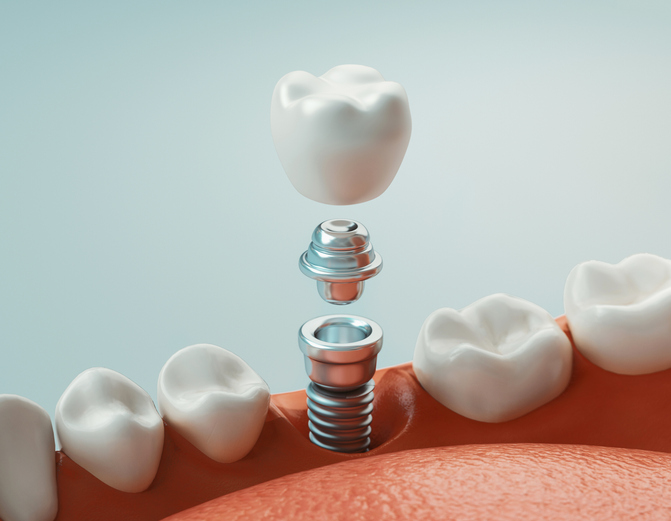Are you tired of hiding your smile because of missing teeth? Do you want a permanent solution that looks and feels natural? Look no further than dental implants in Phoenix, Arizona. Our team of skilled implant dentists is dedicated to helping you regain your confidence and enjoy all your favorite foods again.
We get that the price tag on dental implants might make you pause, but we’ve got budget-friendly choices that still promise top-notch quality. With our state-of-the-art technology and expertise, you can trust us to provide you with the best possible care.
Table of Contents:
- Understanding Dental Implants
- The Dental Implant Procedure
- Choosing the Right Dental Implant Center in Phoenix, Arizona
- Financing Your Dental Implant Treatment
- Maintaining Your Dental Implants
- Conclusion
Understanding Dental Implants
Dental implants are a game-changer for anyone with missing teeth. They’re the closest thing to having your natural teeth back again. But what exactly are dental implants? How do they work? And what are the benefits?
Dental implants are artificial tooth roots that provide a permanent base for fixed, replacement teeth. Compared to dentures, bridges, and crowns, dental implants are a popular and effective long-term solution for people who suffer from missing teeth, failing teeth, or chronic dental problems. Because they fit, feel, and function like natural teeth, dental implants are quickly becoming the new standard in tooth replacement.

Benefits of Dental Implants
There are many advantages to dental implants, including:
- Improved appearance. Dental implants look and feel like your own teeth. And because they are designed to fuse with bone, they become permanent.
- Improved speech. With poor-fitting dentures, the teeth can slip within the mouth causing you to mumble or slur your words. Dental implants allow you to speak without the worry that teeth might slip.
- Improved comfort. Because they become part of you, implants eliminate the discomfort of removable dentures.
- Easier eating. Sliding dentures can make chewing difficult. Dental implants function like your own teeth, allowing you to eat your favorite foods with confidence and without pain.
- Improved self-esteem. Dental implants can give you back your smile and help you feel better about yourself.
- Improved oral health. Dental implants don’t require reducing other teeth, as a tooth-supported bridge does. Because nearby teeth are not altered to support the implant, more of your own teeth are left intact, improving long-term oral health. Individual implants also allow easier access between teeth, improving oral hygiene.
- Durability. Implants are very durable and will last many years. With good care, many implants last a lifetime.
- Convenience. Removable dentures are just that; removable. Dental implants eliminate the embarrassing inconvenience of removing dentures, as well as the need for messy adhesives to keep them in place.
Types of Dental Implants
There are three main types of dental implants:
- Endosteal implants — these are surgically implanted directly into the jawbone. Once the surrounding gum tissue has healed, a second surgery is needed to connect a post to the original implant. Finally, an artificial tooth (or teeth) is attached to the post individually, or grouped on a bridge or denture.
- Subperiosteal implants — these consist of a metal frame that is fitted onto the jawbone just below the gum tissue. As the gums heal, the frame becomes fixed to the jawbone. Posts, which are attached to the frame, protrude through the gums. As with endosteal implants, artificial teeth are then mounted to the posts.
- Zygomatic implants — these are the least common type. They are used when there is not enough jawbone for the endosteal implant, and the shape of the bone is not suitable for the subperiosteal implant. Long implants are placed in the cheekbone rather than the jawbone.
No matter which type of dental implant you choose, they all serve the same purpose: to replace missing teeth and give you back your smile. If you’re considering dental implants in Phoenix, AZ, be sure to consult with a qualified implant surgeon to see which option is best for you.
The Dental Implant Procedure
So you’ve decided to get dental implants. Congrats. You’re on your way to a brand new smile. But what exactly happens during the dental implant procedure? Here’s a quick rundown of what you can expect.
During the consultation, your dental surgeon, Dr. Trujillo will thoroughly examine your teeth and gums and evaluate bone density and quantity. This may involve X-rays and computer tomography scans (CT scans) to ensure there is sufficient bone structure for placing the implant, and to determine exactly where the implant should be placed. Dr. Trujillo will also go over your medical history to make sure you’re a good candidate for dental implants. Be sure to let Dr. Trujillo know about any medications you’re taking or any medical conditions you have.
Surgical Process
The procedure to place a dental implant takes 30 to 60 minutes for one implant and only 2 to 3 hours for multiple implants. The number of appointments and time required, vary from patient to patient. The surgeon will bring great precision and attention to the details of your case.
Prior to surgery you may receive antibiotics and for greater comfort, intravenous sedation or nitrous oxide (laughing gas). These options are discussed with you at your consultation appointment. A local anesthetic will be administered to numb the area where the dental implant will be placed. When you are comfortable, Dr. Trujillo makes a small incision in the gum tissue to reveal the bone, creates space using special instruments, and gently inserts the titanium implant. The top of this implant is often visible through the gum. Sometimes it is better in the early stages of healing to have the implant covered by the gum tissue.
Recovery and Healing
Now the healing begins. The length of time varies from person to person, depending upon the quality and quantity of bone. In some cases, implants may be restored immediately after they are placed. Dr. Trujillo will advise you on follow-up care and timing.
After the initial phase of healing, the Dr. Trujillo places an abutment (support post) or a healing cap onto the dental implant during a brief follow-up visit. This allows gum tissue to mature and provides access to the implant.
Occasionally, impressions are made at the time the implant is placed. This enables the crown to be ready when the implants have healed. How long your mouth needs to heal is determined by a variety of factors. Follow-up care (one to four appointments) is usually needed to ensure that your mouth is healing well and to determine when you are ready for the restorative phase of your treatment.
It may be beneficial to perform a soft tissue graft to obtain stronger, more easily cleaned and natural appearing gum tissue in the area around the implant. This process involves moving a small amount of gum tissue from one part of your mouth to the area around the implant. Most often, it is a brief and relatively comfortable procedure.
Whether it’s one tooth or all of your teeth being replaced, Dr. Trujillo will complete the restoration by fitting the replacement tooth (crown) to the dental implant. Dental implant surgery is a straightforward procedure that most people tolerate very well. It’s normal to have some discomfort and swelling after the surgery, but this can be managed with pain medication and ice packs. Most people feel back to normal within a few days.
If you’re considering dental implants, be sure to find an experienced implant surgeon in Phoenix, AZ who can answer all your questions and help you through the process.
Choosing the Right Dental Implant Center in Phoenix, Arizona
When it comes to getting dental implants, you want to make sure you’re in good hands. But with so many dental implant centers in Phoenix, how do you choose the right one? Here are a few things to keep in mind as you start your search.

Factors to Consider
When choosing a dental implant center in Phoenix, Arizona, there are several important factors to consider:
- Experience and expertise of the periodontal team
- Advanced technology and equipment
- Comprehensive treatment planning
- Personalized care and attention
- Comfortable and welcoming office environment
- Convenient location and hours
- Affordable financing options
It’s important to choose a dental implant center that has a proven track record of success and prioritizes patient safety, comfort, and satisfaction. Take the time to research your options, read patient reviews, and schedule consultations with potential providers to find the best fit for your needs and goals.
Questions to Ask
When consulting with a potential dental implant provider in Phoenix, Arizona, it’s important to ask the right questions to ensure you’re making an informed decision. Some key questions to ask include:
- What is your experience with dental implant procedures?
- What technology and techniques do you use to ensure optimal results?
- Can you walk me through the treatment process and timeline?
- What can I expect in terms of recovery and downtime?
- Do you offer sedation dentistry options for patient comfort?
- What are your success rates for dental implant procedures?
- Do you have before-and-after photos or patient testimonials I can view?
- What financing options do you offer?
- What kind of follow-up care and support do you provide?
Don’t hesitate to ask any other questions you may have about the provider’s qualifications, approach to care, and commitment to patient satisfaction. The right dental implant center will take the time to address your concerns and help you feel confident in your treatment plan.
Researching Your Options
When researching dental implant centers in Phoenix, Arizona, there are several steps you can take to narrow down your options and find the best provider for your needs:
- Check for board certification and professional memberships, such as the American Academy of Implant Dentistry or the International Congress of Oral Implantologists.
- Read patient reviews and testimonials on the practice’s website, Google, Yelp, and other online platforms to get a sense of other patients’ experiences.
- Look for a practice that uses advanced techniques and technology like All-On-4 implants.
- Consider the location and convenience of the practice, including parking, public transportation access, and hours of operation.
- Inquire about financing options and whether the practice accepts your dental insurance plan.
- Schedule a consultation with the provider to discuss your specific needs, ask questions, and evaluate your comfort level with the practice and staff.
By taking the time to thoroughly research your options, you can feel confident in choosing a dental implant center in Phoenix that will provide the highest quality care and help you achieve your smile goals.
Financing Your Dental Implant Treatment
Let’s face it, dental implants aren’t cheap. But they are a worthwhile investment in your oral health and quality of life. So how do you pay for them? Here are a few options to consider. Dental insurance typically does not cover dental implants, because most insurance companies categorize them as a “cosmetic procedure.” However, many dental implant centers in Phoenix, Arizona offer financing options to make the treatment more affordable for patients. It’s worth checking with your insurance provider to see if they offer any coverage for dental implants. Some plans may cover a portion of the cost, especially if the implants are deemed medically necessary.
Payment Plans
Arizona Periodontal Group in Phoenix, Arizona offers flexible payment plans to help patients manage the cost of treatment. These plans allow you to spread out the cost of your dental implants over several months or even years, often with little or no interest. Some common types of payment plans for dental implants include:
- In-house financing: Some dental practices offer their own financing options, which may include a low down payment and affordable monthly payments.
- Third-party financing: Dental practices may partner with third-party financing companies like CareCredit to offer patients a variety of payment plans and financing options.
- Dental savings plans: These plans are not insurance, but rather a membership program that provides discounts on dental services, including implants, for an annual fee.
It’s important to carefully review the terms and conditions of any payment plan or financing option before committing, and to choose a plan that fits your budget and financial goals.
Financing Alternatives
In addition to payment plans and financing options offered by dental implant centers, there are several other ways to make dental implants more affordable:
- Health savings accounts (HSAs) or flexible spending accounts (FSAs): If you have an HSA or FSA through your employer, you may be able to use these funds to pay for dental implants and other dental procedures.
- Dental schools: Some dental schools offer discounted rates on dental implants and other procedures performed by students under the supervision of experienced dentists.
- Crowdfunding: Some patients have successfully used crowdfunding platforms like GoFundMe to raise money for their dental implant treatment.
- Personal loans: Taking out a personal loan from a bank or credit union can be another way to finance dental implants, especially if you have good credit and can qualify for a low-interest rate.
Ultimately, the best financing option for your dental implant treatment will depend on your individual financial situation and goals. It’s important to explore all your options and choose a plan that works for you.
Maintaining Your Dental Implants
Congrats, you’ve got your new dental implants. Now it’s time to take care of them so they last a lifetime. Here’s what you need to know about maintaining your dental implants.

Oral Hygiene Practices
Proper oral hygiene is crucial to maintaining the health and longevity of your dental implants. Here are some best practices to follow:
- Brush twice a day: Use a soft-bristled toothbrush and low-abrasive toothpaste to gently brush your teeth, gums, and implants twice a day.
- Floss daily: Flossing helps remove plaque and food particles from between your teeth and around your implants. Use a water flosser or interdental brush if traditional flossing is difficult.
- Use an antimicrobial mouthwash: Rinsing with an antimicrobial mouthwash can help kill bacteria and freshen your breath.
- Avoid smoking and limit alcohol consumption: Smoking and excessive alcohol consumption can slow down the healing process and increase the risk of implant failure.
- Eat a healthy diet: A diet rich in vitamins and minerals can help support healthy gums and bones, which are essential for maintaining dental implants.
By following these oral hygiene practices consistently, you can help ensure the long-term success of your dental implants.
Regular Dental Check-ups
In addition to maintaining good oral hygiene at home, it’s important to schedule regular check-ups with your dental implant provider, Dr. Trujillo. These appointments typically include:
- Professional cleaning: Your dental hygienist will clean your teeth, gums, and implants to remove any plaque or tartar buildup.
- Examination: Your dentist will examine your implants, gums, and bite to ensure everything is functioning properly and there are no signs of complications.
- X-rays: Periodic x-rays may be taken to monitor the health of your jawbone and ensure the implant is properly integrating with the bone.
- Maintenance: If any issues are detected, your dentist may recommend additional treatments or adjustments to your oral hygiene routine.
Key Takeaway:
Dental implants in Phoenix, AZ are a solid choice for anyone missing teeth, offering a natural look and feel. They improve speech, comfort, eating habits, and self-esteem while boosting oral health without affecting adjacent teeth. With various types including endosteal and subperiosteal, it’s crucial to consult with an experienced periodontist to find the best fit for you. The procedure is straightforward but involves careful planning, and recovery time varies by individual. Choosing the right dental implant center involves considering experience, technology, patient reviews, location convenience, among other factors. Financing options like payment plans or HSAs can make treatment more accessible.
Final Thoughts
Dental implants in Phoenix, Arizona, can change your life for the better. No more worrying about gaps in your smile or struggling to eat the foods you love. Our affordable implant solutions and experienced team are here to help you every step of the way.
Don’t wait any longer to get the smile you want. Contact us today to schedule your consultation and learn more about how dental implants can benefit you. Your new smile is just a phone call away!

Don’t Wait to Get the Smile You Want
Call Dr. Trujillo in Phoenix, AZ, for a personalized treatment plan! We want you to feel confident and smile your best. Call today!






